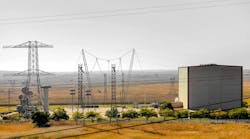The U.S. Department of Energy last week announced US$25 million in funding for 10 projects as part of the Performance-based Energy Resource Feedback, Optimization, and Risk Management (PERFORM) program. These projects will work to develop innovative management systems that represent the relative delivery risk of each asset, like wind farms or power plants, and balance the collective risk of all assets across the grid.
“Ensuring the reliability of our nation’s critical energy infrastructure and electric grid is of the utmost importance to America’s energy security and national security,” said Under Secretary of Energy Mark W. Menezes. “Investing in new technologies and systems that minimize risk and bolster the reliability of U.S. energy will allow us to utilize all of our abundant energy resources in a more integrated and secure manner.”
“Our grid is a crucial asset in supplying reliable power to millions of Americans across the nation.” said Advanced Research Projects Agency-Energy Director Lane Genatowski. “These PERFORM teams will develop the tools to further optimize renewable resources into the grid, improving reliability, reducing energy imports, and further strengthening a pathway to sustainable energy independence.”
PERFORM teams will design risk scores that communicate the delivery risk of an asset’s offer, such as the reliability of electricity from a solar plant due to the weather on a given day. They will also develop grid management systems that internally capture uncertainty and evaluate the system risk to meet or exceed a set baseline. This risk-driven paradigm will enable grid operators to better maintain a supply-demand balance and system reliability, even with the intermittency of renewables. In turn, they can optimally manage the system and assess the true value of essential reliability services in real time, allowing for a more diverse energy mix.
The modern grid relies on conventional, bulk power plants to provide the flexibility to operate power systems reliably. In general, these assets can guarantee available capacity, except in rare events like the sudden loss of power. The existing risk management strategy protects against those rare events, and aligns well with conventional technologies. However, there is a need for this strategy to be reassessed due to new technologies and a shift in the power generation mix. That shift includes a growing increase in intermittent renewable resources, distributed energy resources (DER), and storage technologies. As emerging technologies are deployed, management systems must be able to leverage all capabilities of these new technologies to maintain an economical and reliable grid. PERFORM projects address that need, by developing methods to quantify and manage risk at the asset level and at the system level for the grid.
A sampling of PERFORM projects can be found below; for the full list of projects click here.
Duke University – Durham, NC
A Grid that’s Risk-Aware for Clean Electricity – GRACE - $2,437,443
A Grid that’s Risk-Aware for Clean Electricity (GRACE) is an energy management system (EMS) framework for characterizing the uncertainty of electric power system assets to optimize their performance. The proposed EMS determines the scheduling, dispatch, and compensation of different resources in organized wholesale electricity markets and vertically integrated utilities by building upon industry-implemented market structure and algorithms to incorporate risk considerations. The team will characterize uncertainty of grid asset performance, determine risk-aware reserve targets and asset commitment and dispatch, and translate performance uncertainty into risk scores and associated compensation for energy and reserves. GRACE will be ready for seamless near-term integration into industry practice and reduce system-wide costs and emissions.
Lehigh University – Bethlehem, PA
Application of Banking Scoring and Rating for Coherent Risk Measures in Electricity Systems - $2,500,623
Lehigh University will develop a framework for asset and system risk management that can be incorporated into current electricity system operations to improve economic efficiency through the establishment of an electric assets risk bureau. Currently, discrepancies exist between the power scheduled by a system operator and actual power generated and/or consumed. To address this issue, Lehigh will use scoring and rating concepts from banking and financial institutions as well as optimization methods in dispatching power systems to help system operators and electricity markets schedule resources. Lehigh's research will counteract two failures in electricity system operations—imperfect information and missing markets for risk management products—by developing risk scores at the asset level with the collected historical data and incorporating scoring into decision making at the system level.


